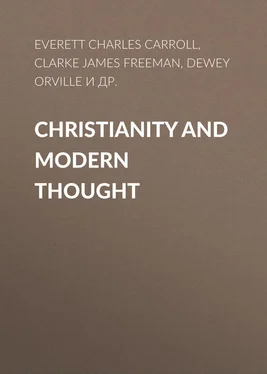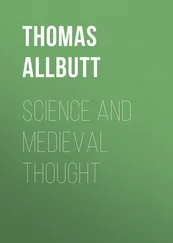Andrew Peabody - Christianity and Modern Thought
Здесь есть возможность читать онлайн «Andrew Peabody - Christianity and Modern Thought» — ознакомительный отрывок электронной книги совершенно бесплатно, а после прочтения отрывка купить полную версию. В некоторых случаях можно слушать аудио, скачать через торрент в формате fb2 и присутствует краткое содержание. Жанр: foreign_antique, foreign_prose, на английском языке. Описание произведения, (предисловие) а так же отзывы посетителей доступны на портале библиотеки ЛибКат.
- Название:Christianity and Modern Thought
- Автор:
- Жанр:
- Год:неизвестен
- ISBN:нет данных
- Рейтинг книги:5 / 5. Голосов: 1
-
Избранное:Добавить в избранное
- Отзывы:
-
Ваша оценка:
- 100
- 1
- 2
- 3
- 4
- 5
Christianity and Modern Thought: краткое содержание, описание и аннотация
Предлагаем к чтению аннотацию, описание, краткое содержание или предисловие (зависит от того, что написал сам автор книги «Christianity and Modern Thought»). Если вы не нашли необходимую информацию о книге — напишите в комментариях, мы постараемся отыскать её.
Christianity and Modern Thought — читать онлайн ознакомительный отрывок
Ниже представлен текст книги, разбитый по страницам. Система сохранения места последней прочитанной страницы, позволяет с удобством читать онлайн бесплатно книгу «Christianity and Modern Thought», без необходимости каждый раз заново искать на чём Вы остановились. Поставьте закладку, и сможете в любой момент перейти на страницу, на которой закончили чтение.
Интервал:
Закладка:
When Constantine, who is generally called the first Christian emperor, – but who was very far from being a real Christian, – when Constantine became nominally a Christian, he did not leave off being the high bridge-maker of the heathen. He remained high priest of the heathen at the same time he was a Christian emperor; and he found means, as well as his son after him, to keep the two functions. He acted on some occasions as high pontiff of the heathen; on other occasions, he called councils, presided over them, and sent them away when he had had enough of their presence; declared to the bishops that he was in some sense one of them, and acted to all intents and purposes as popes have acted after him. Thus that title remained the type of whatever was most sacred in Rome; and the bishop of Rome, when an opportunity came, – when the title had been lost in Rome by emperors, – took it up again. And thus we see on the same stone, at the present time in Rome, the name of a high bridge-maker who is a heathen emperor, and the name of a high bridge-maker who is a pope, who is the head of the Christian Catholic Church. Thus you see an old superstition, an old local superstition, established with a political meaning, has survived itself, has survived centuries, has survived the downfall of heathenism, and is at the present time flourishing. You all know that the present pope is called Pontifex Maximus ; it is his title; and everywhere you see, even on the pieces of money, that Pio Nono is Pontifex Maximus , – the great bridge-maker, which means the highest of all priests, of all sacred beings. Thus has tradition, on that special spot, and in connection with the history and with the antiquities of that spot, established an authority unequalled anywhere else.
Though the Roman Catholic Church is special to that place, and inherits the local habits and traditions, it pretends also to universality. This is, again, perfectly Roman. The heathen Romans had thought for centuries that the world was made to be conquered by them; that unity was represented by Rome; that Rome was all in all; and at the present time the Pope, on Thursday of every Easter week, gives his solemn blessing, as you know, to the town first, and the world afterwards, — urbi et orbi . All countries, both hemispheres, all nations, all languages, are lost in that great unity. One town and one world, of which that town is the capital, – that was the wish, the hope of the heathenish Romans for centuries; and that has been the aim, the assumption of papal Rome for centuries also. When the present Pope said, on a celebrated day, after enumerating the great acts of his pontificate, that he had created more bishoprics than any other pope, he was right. He has created, on his own authority, bishoprics in Holland, in England, and in other countries; cut out bishoprics on the map of those countries. And he did that because, as pope, he is the spiritual sovereign of the world; because England and Holland belong to him; because Rome is the capital of the world; and he cuts off a part of any country, in America as well as in Europe, in order to make of it the see or dominion of a bishop. The old Roman idea was that nobody knew how to govern except Romans. They assumed – and often, if an unscrupulous government was the best of all, if a tyrannical government was the best of all, they were right – to govern better, more wisely, and with more acute politics, than any other nation. They said, "Other sciences, other arts, may be the share of other nations; but our share in the great things of this world is government ." I hardly dare to speak Latin in an English country, because I cannot pronounce Latin as you do; but though I pronounce it as a Frenchman, which is, perhaps, a shade less bad than to pronounce it as you do in England and America, you may guess what I mean when I recall to the memory of some of you the famous lines of Virgil, where he says what must be, in this world, the function of the Romans: —
"Tu regere imperio populos, Romane, memento;
Hæ tibi erunt artes."
That is to say, "You Romans! remember that you are made to govern the nations; that must be your office; all the arts come after this; this is the special Roman art." I declare to you that at this present moment the clergy, the cardinals, the bishops, the prelates, the court of Rome, think, and have never ceased to think, that they are the people to govern better than any other political body; and that the government of the world has been providentially reserved to that town; first, in a temporal way, for the heathen; and, secondly, in a spiritual way, for the Christians, for the Catholic countries of the world. And as they believe spiritual things are a great deal more important than temporal things, they think their government is a great deal more important, and greatly superior to any government of any kind.
Let us now turn back a little again, and try more fully to understand what the old Roman genius was in its way of government. They governed by laws. You all have heard about Roman law, about Roman jurisprudence. It has been said for centuries that they were men who, better than any other, understood the art of making laws, – very precise, full of foresight, forgetting nothing, or few things, and giving in the most exact terms the decisions to be enforced in all possible cases, at least in all the cases with which they had occasion to deal. It is said also, it has always been said, that their laws were hard; but they accepted them, though hard: " dura lex, sed lex ." And certainly there was something noble and good in this respect for law, whatever the law was: there was something just, really in the interest of nations, in this love of law. But at that time this love of law was accompanied by the fact that the law was exceedingly hard in a great number of cases. Yet that hardness was in conformity with the general temperament of the nation at that time: the Romans were hard.
I have no time to stop to show you how different they were from the Greeks; but you remember that when the Greeks assembled in one of their great annual festivals, they heard music, they listened to poetry, they listened to the works of the historian; or they saw men run races, or engage in one of those contests that were not cruel, that were only displays of strength, agility, or training. That was the pleasure of the Greeks in their annual festival. What did the Romans do? You all know. They had immense amphitheatres where they assembled to see men kill one another. Their pleasure was to see people die, to see people suffer, to see people maimed, and weltering in their blood: that was their favorite amusement. And ambitious men in that day secured votes by bringing lions, hyenas, and tigers, in large numbers, to Rome, and by giving the people the diversion of seeing those animals killing men, devouring living men, women, and children, living Christians, often. That was the punishment in fashion at that time: Christian men, women, and children were killed, were devoured, were mangled before the eyes of the people, and for their pleasure. In their hardness they had a taste for the formal, precise execution of their law, whatever it might be. Christianity came and swept away their abominable pleasures, – this cruelty, which was contrary to every human feeling; but the habit of a sort of hardness, in the infliction of the penalties of law, remained in Rome more than it did in any other place. And this was allied to another feeling of a different nature, but which very well connected itself with it. I mean the Roman love for the literal in every thing. They did not like to understand any thing as metaphorical, as poetry: they liked to take every thing literally; and it was in consequence of this characteristic of the Roman mind that they were able to enforce their law. Even if the result of what the law demanded was absurd, they maintained, for the honor of the law, that it must be literally understood, and literally executed; and they permitted none of those different ways of alleviating the hardships of the law that have been in other places not only allowed, but ordered, by those in command. This is of extreme importance. Perhaps at first sight it does not strike you so, but it is. Remember from what country Christianity came. Christianity came from the East, came from Asia, came from the Jews. The Apostles, the first propagators of Christianity, were Oriental men, were Jews. I have seen part of the Levant, I have seen those very countries, and I can speak of it as a fact known for centuries, that the people of the Orient never speak otherwise than by images. They do not like the shortest way from one point to another; they make the way long. They use flowers, and rays of light, and moonshine, or any thing else that gives an image and color to their speech. They bring these things in continually, whatever may be the subject they speak of.
Читать дальшеИнтервал:
Закладка:
Похожие книги на «Christianity and Modern Thought»
Представляем Вашему вниманию похожие книги на «Christianity and Modern Thought» списком для выбора. Мы отобрали схожую по названию и смыслу литературу в надежде предоставить читателям больше вариантов отыскать новые, интересные, ещё непрочитанные произведения.
Обсуждение, отзывы о книге «Christianity and Modern Thought» и просто собственные мнения читателей. Оставьте ваши комментарии, напишите, что Вы думаете о произведении, его смысле или главных героях. Укажите что конкретно понравилось, а что нет, и почему Вы так считаете.












